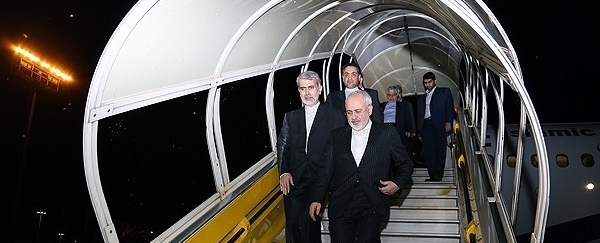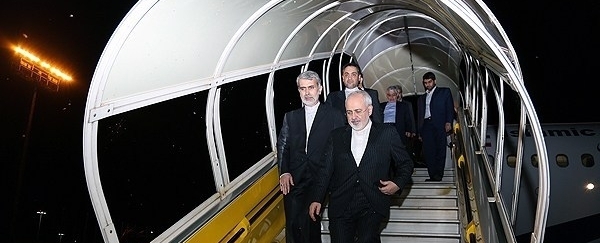 Iran's FM Zarif & president Rouhani's brother and special aide Hossein Fereidoun arrive in Geneva, Switzerland.[/caption]
Iran's FM Zarif & president Rouhani's brother and special aide Hossein Fereidoun arrive in Geneva, Switzerland.[/caption]TEHRAN (FNA)- Iranian Foreign Minister Mohammad Javad Zarif along with the country's nuclear chief Ali Akbar Salehi and President Rouhani's brother and special aide Hossein Fereidoun arrived in Geneva on Saturday to take part in another round of nuclear talks with their US counterparts.
The Iranian and US negotiators have had several rounds of in talks in Geneva on Friday and Saturday, and Zarif and his US counterpart John Kerry are slated to join the negotiations at Geneva's Wilson Hotel on Sunday and Monday.
Salehi is also scheduled to hold talks with US Secretary of Energy Ernest Moniz on Tehran's nuclear program and meet his Swiss counterpart on bilateral ties.
Fereidoun who is also President Hassan Rouhani's brother will accompany Zarif during his meetings "to make the neccessary coordination".

Iranian Foreign Minister Mohammad Javad Zarif (R) & Iranian president's brother Hassan Fereidoun (L)
Iranian Deputy Foreign Minister and senior negotiator Seyed Abbas Araqchi and another deputy foreign minister Majid Takht Ravanchi held 7 and a half hours of talks with their US counterpart Wendy Sherman on Friday.
Speaking after the talks, Araqchi reiterated Iran's opposition to clinching a two-phased nuclear agreement with the world powers.
"We will not have any two-phased agreement," Araqchi said on Friday.
He described the first day of two-day talks between the Iranian and US deputy foreign ministers in Geneva as "positive and serious", and said, "This doesn�t mean that we have had extraordinary progress, but the discussions are pursued closely and intensively."
"We are after innovation and development in the method and form of negotiations to accelerate (settlement of) issues in talks," Araqchi said.
Noting that the Iranian delegation would have another day of meetings with the US team on Saturday, he said that the Iranian deputy foreign ministers would also hold a meeting with their counterparts in the G5+1 on Sunday followed by meetings between the Iranian and US foreign ministers on Sunday and Monday.
His remarks came after Supreme Leader of the Islamic Revolution Ayatollah Seyed Ali Khamenei underlined earlier this month that Iran would never accept a bad agreement with the world powers, adding that the country is in favor of a single-phase comprehensive deal which would respect the Iranian nation's inalienable rights and entail all details.
"I agree with an agreement if it can be struck, but I disagree with a bad agreement," the Supreme Leader said in a meeting with the commanders and personnel of the Iranian Air Force and Air Defense in Tehran in February.
He pointed to the US officials' remarks that "disagreement is better than a bad agreement", and said, "We believe the same and we believe that not agreement is better than striking an agreement that would harm the national interests and pave the way for humiliating the great Iranian nation."
The Leader further stressed his opposition to striking a deal over general issues and leaving the details for some other time in future, saying that a final agreement should include all the general principles and all the details together and should not leave anything for future.
The Supreme Leader reiterated that the Iranian nation will not tolerate bullying, excessive demands and illogical behavior.
Ayatollah Khamenei stressed that the general points and technical details of any accord need to be agreed upon simultaneously as the US has already proved that it tries to escape its undertakings under the pretext of different interpretations.
"The contents of such a contract should be transparent, clear and not open to interpretation. The contents of the agreement should not allow the other side which is used to bargaining to seek excuses on different issues," he added.
The 10th round of negotiations between Iran and the six world powers was held in Vienna from November 18 to 24, where the seven nations decided to extend the talks until July after they failed to strike an agreement.
The last round of the nuclear talks between Iran and the six world powers was held in February.
Both Iran and the G5+1 negotiators have underlined that cutting a final deal before the July 10 deadline is possible.
By Fars News Agency











